|
---UPDATED for 2024!--- Someone you know has gotten into blacksmithing and you're looking for an appropriate gift! Never fear! I can get you pointed in the right direction. Honestly, I've lost track of how many gift ideas are in this increasingly epic post. There were 60+ ideas here a few years ago. Compiling and updating this list takes a LOT of time and effort, so there are affiliate links that will give the school a tiny kick-back (I think I made $43 last year, this is an act of love, not a get-rich scheme!). Please feel free to comparison shop and leave me feedback if you find a better product or better deal. 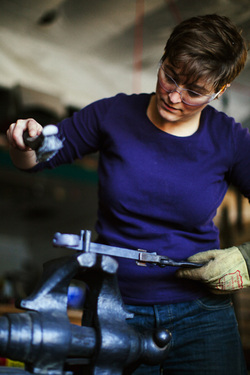 Tongs
I don't know of a single blacksmith who would turn down a well-made set of tongs. You could keep a blacksmith happy for years by buying a different size pair of tongs for every major gifting occasion. Marking and Measuring
Joinery
Finishing
Cutting & drilling
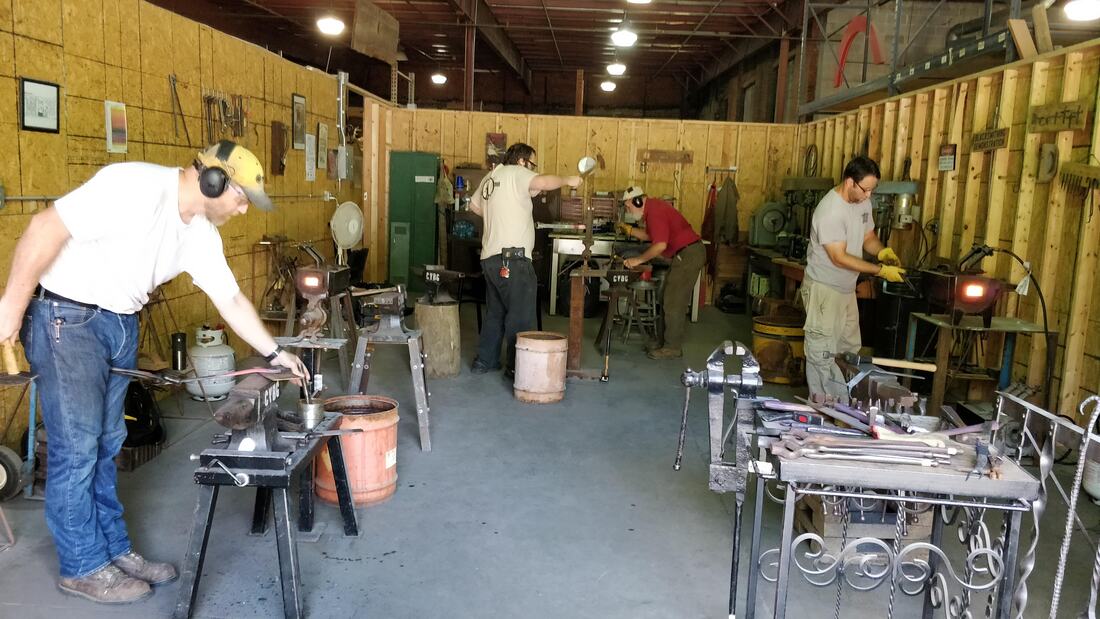 Education Classes I SUPER DUPER recommend getting your blacksmith at least one class a year. Yes, I know that classes can be expensive and can take up precious vacation time. But, it's the fastest way to recharge your blacksmith. They'll come home with new skills, projects, techniques, and ideas. And friends. This list is East-coast-centric, because that's where I've been able to take the most classes. If you run a school that you want included on this list, drop me a line! (In no particular order...)
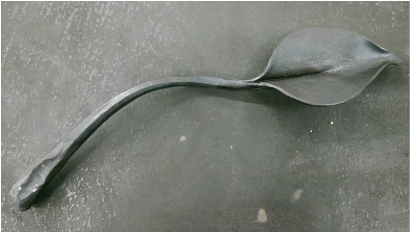 The big tools Your blacksmith is just starting to set up their own shop and you want to help them get there. The most important tools for smithing (forge, forge stand, fuel, anvil, anvil stand, post vice, post vice stand, hammer) are actually the most challenging items to list in a gift guide because so much depends on their shop setup and their personal preferences.
 Safety Eyes
Face
Hands/Arms
Workwear
First Aid
Fire safety
Other good stuff A blacksmith shop takes time and energy to maintain. Having good quality tools helps your smith spend time doing what they like best: forging. This part of the list includes the stuff that helps me stay productive in the shop.
Giving back
Maybe your blacksmith has it all! Or, perhaps you're interested in supporting the craft as a whole! You may support these organizations with funding to support daily functions, scholarships, or relief grants:
All of these organizations would be happy to work with you to set up regular donations or planned giving. 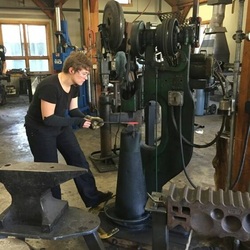 Caitlin at the power hammer. John C Campbell Folk School Caitlin at the power hammer. John C Campbell Folk School I read an article about Lance Armstrong before his fall from grace. The article talked about how Mr Armstrong devoted all of his energy to biking; if he wasn't training, he was conserving his energy so that he could make the most of his next training session or his next race. I'd never thought of it that way. I thought of athletes as the folks who go out of their way to take the stairs. To lift the heavy thing. To go at top speed just because they can. But this article (I'm trying to track it down, please bear with me) asserted that Lance Armstrong takes the elevator. Energy is a limited resource for all of us. For some, it's an extremely limited resource (see spoon theory). Sometimes folks (think: small children, people on certain legal and illegal substances, morning people) don't *seem* to have limits, but then things are quiet for a moment and you find that they've fallen asleep. It can be incredibly useful to keep in mind that there is a finite amount of work that can be accomplished in a day. (Okay, yes, I will acknowledge that some of you will find this thought very depressing. That doesn't make it less true, but if you need a minute, please take a minute. It gets better, I promise!) Alright! Glad to have you back! So here's the good news: Having limited energy, limited time, and only so much work you can accomplish in one day is a great reason to be LAZY. Yes, that's right. I think we should all be LAZY. But I think you should be lazy in order to get more done. Consciously choosing to do things that save you time and energy means that you can smith for longer.
Blacksmiths are a very resourceful group of folks. They are always on the lookout for ways to save time and energy. Send me your favorite lazy blacksmith tip ([email protected]) and I'll add it to the list!
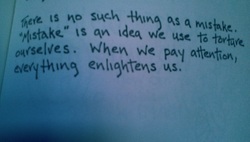 "There is no such thing as a mistake. 'Mistake' is an idea we use to torture ourselves. When we pay attention, everything enlightens us." --Cheri Huber, That Which You are Seeking is Causing You to Seek My student swings the hammer and misses the mark. "I'm sorry!" the words leap to lips and spill out, dismay clearly evident. No one is injured. The hammer simply didn't fall in the right place. "No worries!" I say, "This is part of the learning process!" And I smile. Then we talk about how the metal reacted to the errant swing. I point out that something that was a "mistake" in one situation ends up being a "technique" in another. We discuss and move on. This scene has played out not once or twice, but dozens of times. And the dismay on my student's face secretly breaks my heart. It breaks my heart partly because making mistakes is a crucial part of learning to do something the right way. Niels Bohr said "An expert is a person who has found out by his own painful experience all the mistakes that one can make in a very narrow field." It's not a snappy quotation, (and ohmygosh, implying only men can be experts!!) but look at him allude to "painful experience". Look at how he talks about "all the mistakes". Learning can be really hard, folks. My students want to learn, be successful, do amazing things, but there is a crushing fear of making mistakes. But each mistake can be a treasure trove of learning, if we pay attention. Errors are inevitable, but an experienced smith can identify errors early on, and fix them before they become problems. And how do you become an experienced smith? Well, you make all the mistakes there are to make. (And you watch others make mistakes and fix them. And you read about others making mistakes and fixing them. And you try different fixes to the same mistake. And on and on and on.) Mistakes and their fixes are THE MOST IMPORTANT PART of learning. I work extra special hard to create a safe space for students to learn and explore. I'm here to help, to answer questions, to provide options, encouragement, and moral support, but students get to make --and fix-- their own mistakes. And that means that they are empowered to do their own troubleshooting, which makes them a better smith down the road. When I was first learning how to smith, there were a lot of well-meaning folks who tried to help me avoid making mistakes. I lost track of the number of times that someone took my hammer out of my hand and "fixed it" for me. This happened most memorably in the middle of a speed forging competition. Because of this, I became very interested in what I could learn from my mistakes, and I think I'm a better smith because of it.  PUFFINS!!! PUFFINS!!! I burned out last summer. I probably don't have to describe the emotional exhaustion, the hopelessness, and the eternal frustration because burn-out is pretty common (http://www.statista.com/topics/2099/stress-and-burnout/). If you're not feeling burnt out yourself, it's likely that half of your friends could fill you in on what it's like. But this isn't a post about burn-out. It's a post about puffins. Normally when I travel, I research everything. But when I ended up in Iceland for a whirlwind business trip, I was completely unprepared. I found myself on top of a plateau overlooking black sand beaches at dusk, and I was astonished to see THOUSANDS of puffins perched on the cliff edge, riding the thermals, grooming each other, and hovering mid-air, wings invisibly flapping. Puffins, it turns out, flap their wings 400 times per minute (https://en.wikipedia.org/wiki/Puffin), which makes them look like little sad-eyed, colorful-beaked, torsos zooming about. Giant clown-faced humming birds. I recorded a little video of my unabashed excitement, but it was automatically deleted by my phone. I wish so fervently that I still had that clip because it captured the exact moment when I fell in love with the world again. (Okay, I found a fragment of a video from that day.) It's possible that I cried a little bit. It's possible that I hugged a random tourist. It's possible that I watched the birds until it was too dark to see them anymore. I wouldn't say that my life changed dramatically in that moment, but it reminded me how important it is to see and do new things. And then I ran into this article: http://www.nhs.uk/conditions/stress-anxiety-depression/pages/learn-for-mental-wellbeing.aspx I've noticed that doing new things helps me handle stress and depression better. It makes my world larger and more full of hope and possibility. If you're struggling right now, I hope that you find your puffin. Iceland should be on your short list--it's spectacular. But if you need something a bit closer to home (and home is within driving distance to Frederick, MD), I humbly offer my blacksmithing lessons. There is obviously no way that I can claim that blacksmithing treats stress, anxiety, or depression. And there's no way to predict whether you'll fall in love with it like I did. But it's widely believed that exercise helps mental-well-being, and you'll definitely get some exercise swinging a hammer. And you get to make art. And meet me, and I'll tell you all about the puffins in person. Caitlin |
AuthorBlacksmith, instructor, mischief-maker. Archives
December 2025
Categories
All
|
The legal stuff (disclaimer, privacy, terms, opt-out)
Frederick Location: 26 West All Saints Street, Frederick, MD 21701
Lititz Location: 130 Rodney Ln, Lititz, PA 17543
Frederick Location: 26 West All Saints Street, Frederick, MD 21701
Lititz Location: 130 Rodney Ln, Lititz, PA 17543

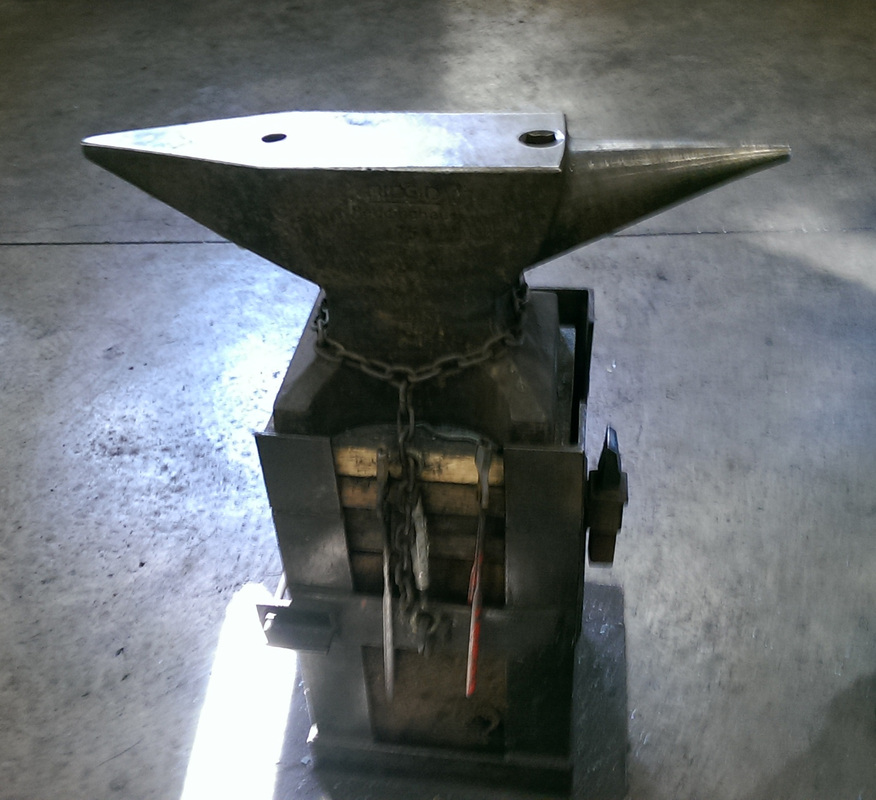
 RSS Feed
RSS Feed